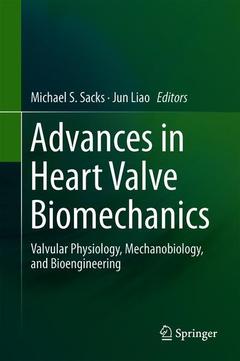Advances in Heart Valve Biomechanics, 1st ed. 2018 Valvular Physiology, Mechanobiology, and Bioengineering
Coordonnateurs : Sacks Michael S., Liao Jun

This book covers the latest research development in heart valve biomechanics and bioengineering, with an emphasis on novel experimentation, computational simulation, and applications in heart valve bioengineering. The most current research accomplishments are covered in detail, including novel concepts in valvular viscoelasticity, fibril/molecular mechanisms of tissue behavior, fibril kinematics-based constitutive models, mechano-interaction of valvular interstitial and endothelial cells, biomechanical behavior of acellular valves and tissue engineered valves, novel bioreactor designs, biomechanics of transcatheter valves, and 3D heart valve printing. This is an ideal book for biomedical engineers, biomechanics, surgeons, clinicians, business managers in the biomedical industry, graduate and undergraduate students studying biomedical engineering, and medical students.
Biological Mechanics of the Heart Valve Interstitial Cell.- Endothelial Mechanotransduction.- The Role of Proteoglycans and Glycosaminoglycans in Heart Valve Biomechanics.- On the Unique Functional Elasticity and Collagen Fiber kinematics of Heart Valve Leaflets.- Tricuspid Valve Biomechanics: A Brief Review.- Measurement Technologies for Heart Valve Function.- Calcific Aortic Valve Disease: Pathobiology, Basic Mechanisms, and Clinical Strategies.- Remodeling Potential of the Mitral Heart Valve Leaflet.- Molecular and Cellular Developments in Heart Valve Development and Disease.- Mechanical Mediation of Signaling Pathways in Heart Valve Development and Disease.- Tissue Engineered Heart Valves.- Decellularization in Heart Valve Tissue Engineering.- Novel Bioreactors for Mechanistic Studies of Engineered Heart Valves.- Bioprosthetic Heart Valves: From a Biomaterials Perspective.- Computational Modeling of Heart Valves: Understanding and Predicting Disease.- Biomechanics and Modeling of Tissue-Engineered Heart Valves.- Fluid–structure interaction analysis of bioprosthetic heart valves: the application of a computationally-efficient tissue constitutive model.- Towards Patient-Specific Mitral Valve Surgical Simulations.
Covers the latest research accomplishments in heart valve biomechanics
Broadens readers’ understanding of novel concepts in valvular tissue viscoelasticity, collagen fibril/molecule mechanisms, hierarchical response of valvular tissue under deformation, cell-ECM interaction, and integrative multi-scale models
Maximizes reader insights into advanced computational modeling and simulation efforts of heart valve biomechanics driven by updated knowledge and high performance computing
Reviews exhaustively the key recent research into biomechanical investigations on the breakthrough approach/techniques such as tissue engineered heart valve/regeneration, transcatheter valve replacement, 3D imaging guided valve repair, and 3D bioprinting
Date de parution : 04-2019
Ouvrage de 487 p.
15.5x23.5 cm
Thèmes d’Advances in Heart Valve Biomechanics :
Mots-clés :
GAGs in heart valve biomechanics; automated heart valve bioreactors; bending force in heart valve development; biomechanics in mitral valve repairing; biomechanics of myxoid mitral valves; biomechanics of transcatheter heart valves; biomechanics tissue engineered heart valves; cardiac biomaterials; computational modeling for the mitral heart valve; computational modeling of heart valves; decellularized heart valve scaffolds; geometrical symmetry in bioprosthetic heart valve; heart valve 3D printing; heart valve calcification; heart valve leaflets; heart valve mechanotransduction; heart valve tissue engineering; mechanobiology of heart valve endothelial cells; pregnancy-induced remodeling in heart valves; viscoelasticity of heart valve tissues



